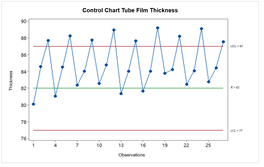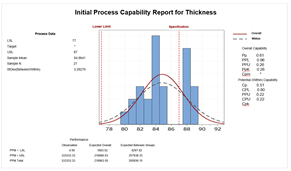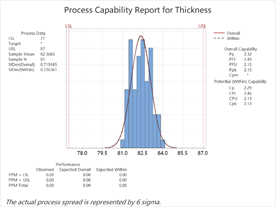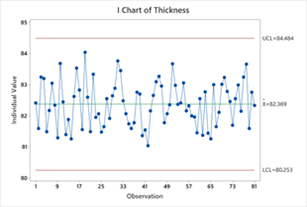The Minitab® client is one of the world’s largest solar technology and renewable energy companies. For more than 20 years, it has been a leading manufacturer of solar PV modules and a provider of solar energy solutions. The company strives to deliver competitive, clean electricity to large energy buyers, and prides itself on its sustainability efforts.

The Challenge
Inconsistencies in manufacturing process due to unidentified factors
The Research and Development manager at a solar power company location in Shanghai, China had a problem. His team discovered that their manufacturing process was producing unacceptable levels of variability in the thickness of their silicon nitride films. They needed to control the thickness of the film to improve the solar cells’ surface energy efficiency levels and to meet internal standards. The ideal film thickness is between 77 – 87nm.


As illustrated above, from the initial process, the team found that the film thickness exceeded the upper limit as seen in the control chart, and there were issues with the process. Most of the data fell above the average, and the process capability was relatively low. As a result, the defect rate in the current process was very high.

Customer
Global Solar Technology and Renewable Energy Provider
Organization Profile
- Founded in 2001
- Listed on NASDAQ since 2006
- HQ in Ontario, Canada
The Challenge
One of the world’s largest solar technology and renewable energy companies needed to control the thickness of the silicon nitride film to improve the solar cells’ surface energy efficiency levels after it was discovered that some of the films being produced were not meeting internal standards.
Products Used
Minitab® Statistical Software
Minitab Engage™
Solution
Using the powerful charting and analysis tools included in Minitab® Statistical Software and Minitab Engage™, the company was able to pinpoint and rectify the causes for the differences in film thickness.
Results
- Improved the energy efficiency of the panels by 7%, from 81% to 88%
- Increased production boosted revenues by CNY 650,000 (USD 101,400) annually






